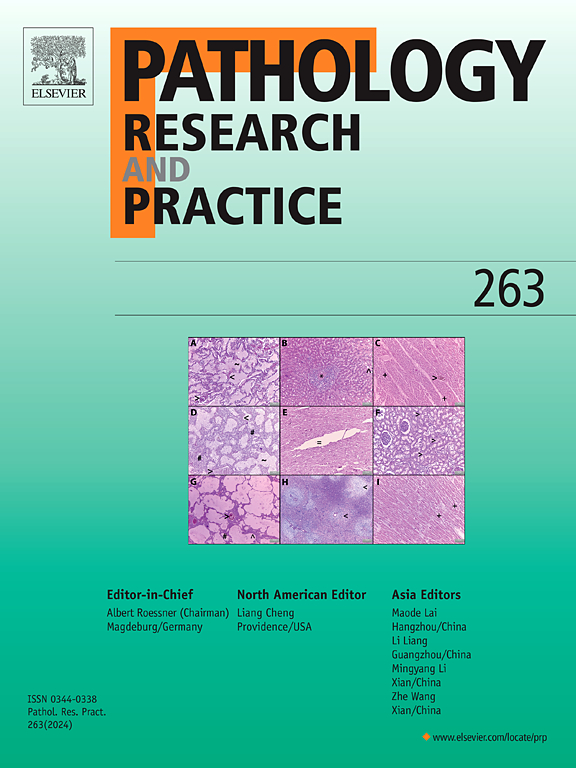METTL3/IGF2BP2通过m6A修饰稳定IQGAP3,通过TGF-β/Smad信号和EMT驱动HCC转移
IF 3.2
4区 医学
Q2 PATHOLOGY
引用次数: 0
摘要
肝细胞癌(HCC)转移是导致死亡的主要原因,但其分子驱动因素仍不明确。在这项研究中,我们发现甲基转移酶样3 (METTL3)是一种在HCC中经常上调的n6 -甲基腺苷(m6A) RNA甲基转移酶,通过m6A介导的致癌蛋白IQ基序中含有gtpase激活蛋白3 (IQGAP3)的转录后上调,作为转移的关键启动子。通过体外肝癌细胞系和体内裸鼠肺转移模型,我们发现mettl3催化的m6A修饰IQGAP3 mRNA增强了IQGAP3的稳定性和表达,从而促进了HCC细胞的迁移、侵袭和肺部定植。METTL3敲低降低了IQGAP3转录本上的m6A标记,降低了IQGAP3水平和转移能力,而异位的IQGAP3表达挽救了侵袭性表型。从机制上说,RNA免疫沉淀分析显示,胰岛素样生长因子2 mrna结合蛋白2 (IGF2BP2)是一种m6A读取器蛋白,可与m6A修饰的IQGAP3转录物结合,延长其半衰期。因此,METTL3-IQGAP3轴激活TGF-β/Smad信号并驱动上皮-间质转化,从而促进转移表型。同样,METTL3缺失或IGF2BP2敲低显著抑制这些途径,并在体外和体内阻碍转移。总之,我们的发现揭示了一种新的依赖于m6a的驱动HCC转移的机制。这个依赖m6a的METTL3-IGF2BP2-IQGAP3轴代表了转移性HCC的一个有希望的治疗靶点。本文章由计算机程序翻译,如有差异,请以英文原文为准。
METTL3/IGF2BP2 stabilizes IQGAP3 via m6A modification to drive HCC metastasis through TGF-β/Smad signaling and EMT
Hepatocellular carcinoma (HCC) metastasis is a leading cause of mortality, yet its molecular drivers remain poorly defined. In this study, we identify methyltransferase-like 3 (METTL3), an N6-methyladenosine (m6A) RNA methyltransferase frequently upregulated in HCC, as a critical promoter of metastasis through m6A-mediated post-transcriptional upregulation of the oncogenic protein IQ motif-containing GTPase-activating protein 3 (IQGAP3). Using HCC cell lines in vitro and a nude mouse lung metastasis model in vivo, we demonstrate that METTL3-catalyzed m6A modification of IQGAP3 mRNA enhances IQGAP3 stability and expression, which in turn drives HCC cell migration, invasion, and lung colonization. METTL3 knockdown reduces m6A marks on IQGAP3 transcripts and decreases IQGAP3 levels and metastatic capacity, whereas ectopic IQGAP3 expression rescues the invasive phenotype. Mechanistically, RNA immunoprecipitation assays reveal that Insulin-like growth factor 2 mRNA-binding protein 2 (IGF2BP2), an m6A reader protein, binds m6A-modified IQGAP3 transcripts to prolong their half-life. Consequently, the METTL3-IQGAP3 axis activates TGF-β/Smad signaling and drives an epithelial-mesenchymal transition, thereby promoting a metastatic phenotype. Concordantly, METTL3 depletion or IGF2BP2 knockdown significantly suppresses these pathways and impedes metastasis in vitro and in vivo. Overall, our findings uncover a novel m6A-dependent mechanism driving HCC metastasis. This m6A-dependent METTL3-IGF2BP2-IQGAP3 axis represents a promising therapeutic target for metastatic HCC.
求助全文
通过发布文献求助,成功后即可免费获取论文全文。
去求助
来源期刊
CiteScore
5.00
自引率
3.60%
发文量
405
审稿时长
24 days
期刊介绍:
Pathology, Research and Practice provides accessible coverage of the most recent developments across the entire field of pathology: Reviews focus on recent progress in pathology, while Comments look at interesting current problems and at hypotheses for future developments in pathology. Original Papers present novel findings on all aspects of general, anatomic and molecular pathology. Rapid Communications inform readers on preliminary findings that may be relevant for further studies and need to be communicated quickly. Teaching Cases look at new aspects or special diagnostic problems of diseases and at case reports relevant for the pathologist''s practice.

 求助内容:
求助内容: 应助结果提醒方式:
应助结果提醒方式:


